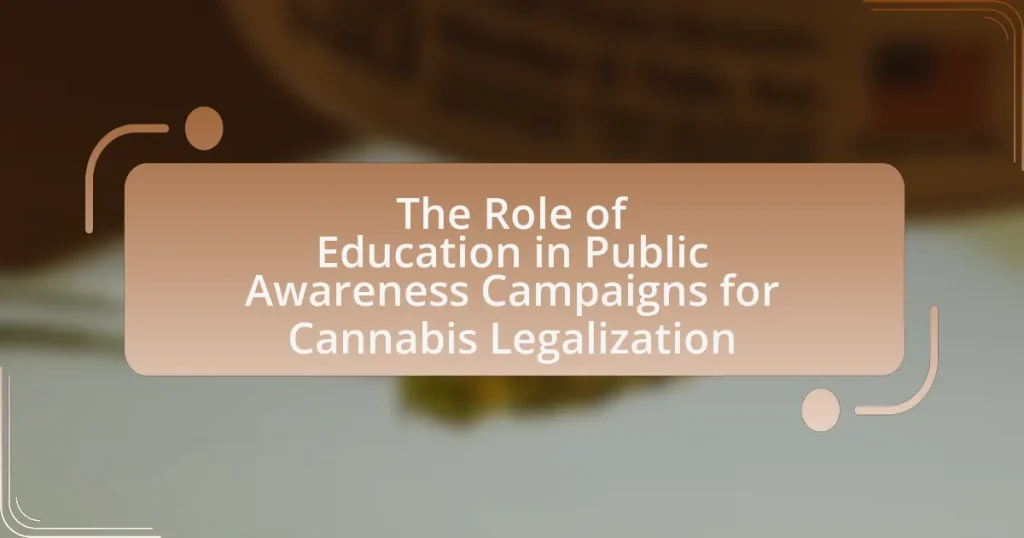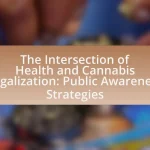The article examines the critical role of education in public awareness campaigns aimed at cannabis legalization. It highlights how effective educational initiatives can inform the public about the benefits and risks of cannabis use, dispel myths, and reduce stigma, ultimately influencing public perception and policy decisions. Key strategies discussed include targeted messaging, community engagement, and the dissemination of evidence-based information. The article also addresses the challenges faced in educating the public, such as misinformation and stigma, while emphasizing the importance of collaboration with experts and community stakeholders to enhance educational outreach.
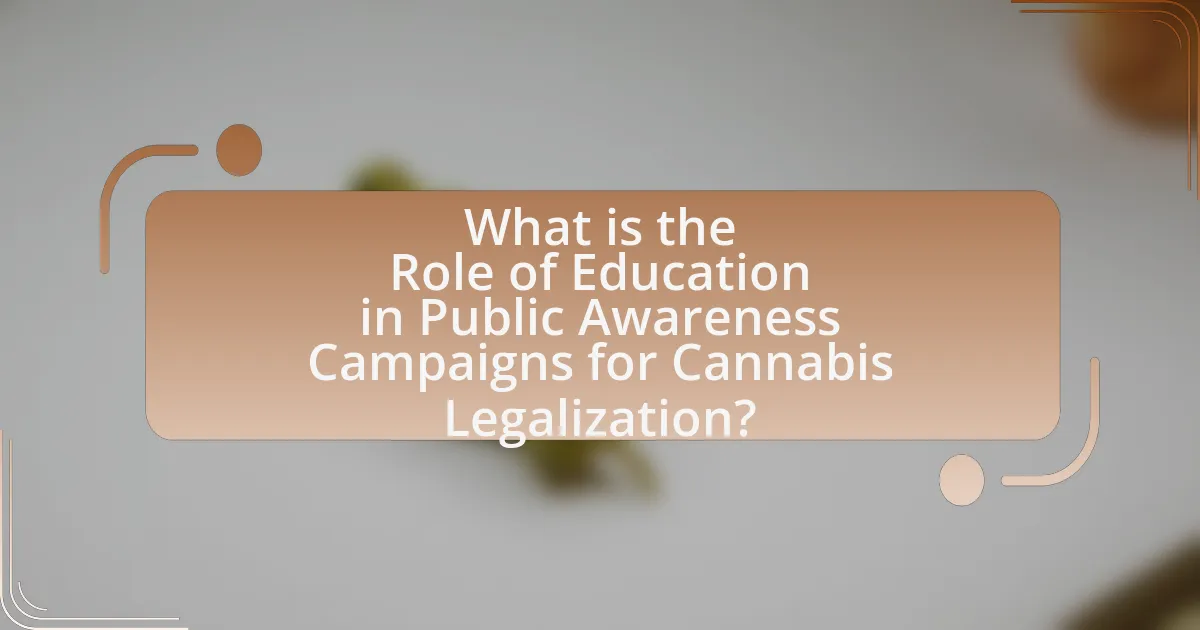
What is the Role of Education in Public Awareness Campaigns for Cannabis Legalization?
Education plays a crucial role in public awareness campaigns for cannabis legalization by informing the public about the benefits and risks associated with cannabis use. Effective educational initiatives help dispel myths, reduce stigma, and provide evidence-based information regarding health, legal, and social implications of cannabis. For instance, studies have shown that states with comprehensive educational campaigns prior to legalization experienced more informed public opinions and higher support for legalization measures. This is evidenced by the 2012 Colorado legalization campaign, which utilized educational outreach to clarify misconceptions about cannabis, leading to a successful vote in favor of legalization.
How does education influence public perception of cannabis legalization?
Education significantly influences public perception of cannabis legalization by providing individuals with accurate information about its effects, benefits, and risks. Research indicates that higher levels of education correlate with more favorable attitudes toward cannabis legalization, as educated individuals are more likely to critically evaluate the stigma surrounding cannabis and understand its medicinal uses. For instance, a study published in the Journal of Drug Issues found that individuals with college degrees were 20% more likely to support legalization compared to those without higher education. This trend suggests that educational initiatives can effectively shift public opinion by dispelling myths and promoting informed discussions about cannabis policy.
What are the key educational strategies used in these campaigns?
Key educational strategies used in public awareness campaigns for cannabis legalization include targeted messaging, community engagement, and evidence-based information dissemination. Targeted messaging focuses on specific demographics to tailor the content effectively, ensuring that the information resonates with the audience’s values and concerns. Community engagement involves local events and discussions that foster dialogue and build trust within communities, allowing for a more personalized approach to education. Evidence-based information dissemination relies on scientific research and data to inform the public about the benefits and risks of cannabis use, enhancing credibility and promoting informed decision-making. These strategies have been shown to increase public understanding and support for cannabis legalization initiatives.
How do educational materials shape public understanding of cannabis?
Educational materials significantly shape public understanding of cannabis by providing accurate information, dispelling myths, and promoting informed discussions. These materials, such as brochures, websites, and educational programs, often present research findings that clarify the effects of cannabis, its medical uses, and legal implications. For instance, studies have shown that states with comprehensive cannabis education programs report lower rates of misinformation and increased public support for legalization. A 2020 survey by the Pew Research Center indicated that 67% of Americans support cannabis legalization, a shift attributed to increased access to educational resources that highlight the benefits and risks associated with cannabis use. Thus, educational materials play a crucial role in influencing perceptions and attitudes towards cannabis in society.
Why is education critical in the context of cannabis legalization?
Education is critical in the context of cannabis legalization because it informs the public about the benefits and risks associated with cannabis use, thereby promoting informed decision-making. Comprehensive education initiatives can dispel myths and misconceptions surrounding cannabis, which is essential for reducing stigma and fostering acceptance in society. For instance, studies have shown that states with robust educational campaigns about cannabis have experienced lower rates of misuse and better public health outcomes. Furthermore, education equips individuals with knowledge about legal regulations, safe consumption practices, and potential health effects, which are vital for responsible use in a legalized environment.
What misconceptions about cannabis can education address?
Education can address misconceptions about cannabis, such as the belief that it is a gateway drug. Research indicates that the majority of cannabis users do not progress to harder substances, as shown in a study published in the Journal of Drug Issues, which found that only 9% of cannabis users develop a substance use disorder. Additionally, education can clarify that cannabis does not impair driving to the same extent as alcohol, with studies demonstrating that while cannabis can affect motor skills, the impact is less severe than that of alcohol. Furthermore, education can dispel the myth that cannabis has no medical benefits; numerous studies, including those published in the Journal of the American Medical Association, have documented its efficacy in treating conditions like chronic pain and epilepsy. By providing accurate information, education can effectively counter these misconceptions and promote a more informed public discourse on cannabis legalization.
How does informed public opinion impact policy decisions regarding cannabis?
Informed public opinion significantly influences policy decisions regarding cannabis by shaping lawmakers’ perceptions and priorities. When the public is educated about the benefits and risks of cannabis, it leads to increased support for legalization efforts, as evidenced by surveys indicating that states with higher public awareness and understanding of cannabis issues tend to adopt more progressive policies. For instance, a 2021 Gallup poll showed that 68% of Americans support cannabis legalization, reflecting a shift in public sentiment that has prompted legislative changes in numerous states. This correlation demonstrates that informed public opinion can drive policymakers to align their decisions with the views of their constituents, ultimately leading to more favorable cannabis legislation.
What are the challenges faced in educating the public about cannabis legalization?
The challenges faced in educating the public about cannabis legalization include misinformation, stigma, and varying state laws. Misinformation arises from historical propaganda and ongoing debates, leading to confusion about the benefits and risks of cannabis use. Stigma persists due to long-standing negative perceptions associated with cannabis, which can hinder open discussions and acceptance. Additionally, the inconsistency of cannabis laws across different states complicates educational efforts, as individuals may receive conflicting information based on their location. These factors collectively impede effective public education and awareness campaigns regarding cannabis legalization.
What barriers exist in disseminating accurate information about cannabis?
Barriers in disseminating accurate information about cannabis include stigma, misinformation, and regulatory restrictions. Stigma surrounding cannabis use often leads to biased perceptions, which can hinder open discussions and the acceptance of factual information. Misinformation proliferates through social media and anecdotal reports, creating confusion and distrust among the public. Regulatory restrictions, such as limitations on research funding and advertising, further complicate the dissemination of accurate information, as they can prevent comprehensive studies and public education campaigns from being developed and implemented effectively.
How can campaigns overcome resistance to cannabis education?
Campaigns can overcome resistance to cannabis education by employing evidence-based messaging that addresses misconceptions and highlights the benefits of cannabis. Research indicates that educational initiatives that provide clear, factual information about cannabis, including its medical uses and safety profiles, can significantly reduce stigma and resistance. For instance, a study published in the Journal of Drug Issues found that individuals exposed to factual information about cannabis were more likely to support legalization and understand its therapeutic potential. By utilizing relatable narratives and testimonials from credible sources, campaigns can further engage audiences and foster a more informed public discourse around cannabis.
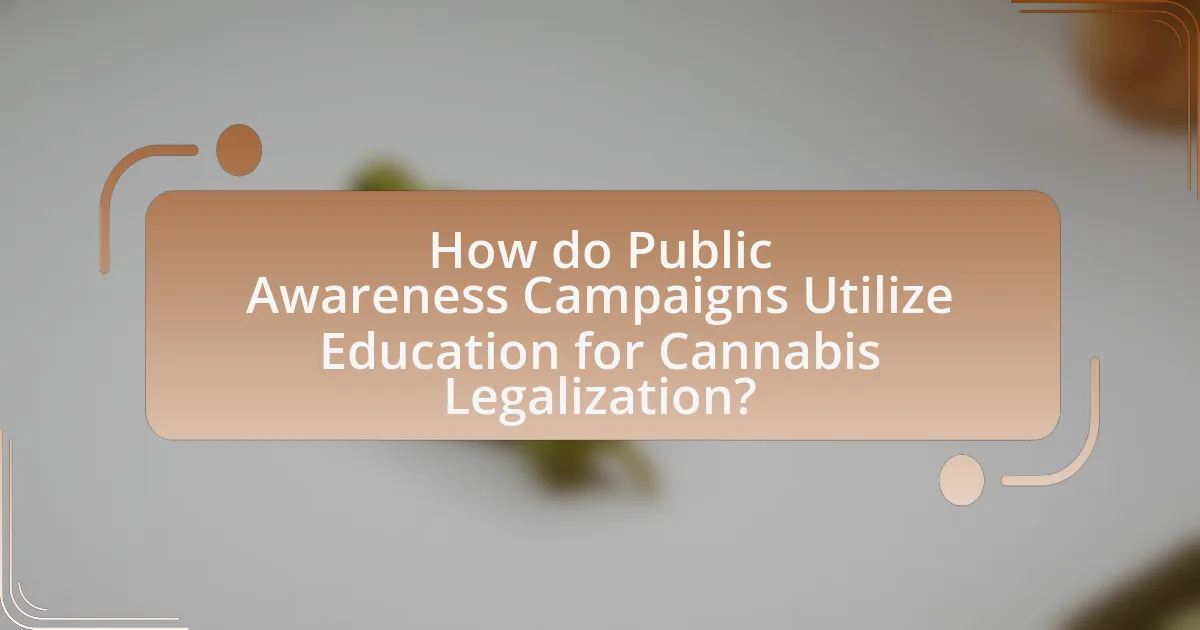
How do Public Awareness Campaigns Utilize Education for Cannabis Legalization?
Public awareness campaigns utilize education for cannabis legalization by disseminating factual information about the benefits and risks associated with cannabis use, thereby shaping public perception and policy. These campaigns often employ various educational strategies, such as workshops, informational brochures, and social media outreach, to inform the public about the legal, medical, and economic implications of cannabis legalization. For instance, studies have shown that states with comprehensive educational campaigns prior to legalization experienced more informed voter bases, leading to higher approval rates for legalization measures. This approach not only addresses misconceptions but also empowers citizens to engage in informed discussions, ultimately influencing legislative outcomes.
What methods are employed in educational campaigns for cannabis legalization?
Educational campaigns for cannabis legalization employ methods such as public information dissemination, community engagement, and targeted messaging. Public information dissemination includes the use of brochures, websites, and social media platforms to provide factual information about cannabis benefits and legal implications. Community engagement involves organizing events, workshops, and discussions to foster dialogue and address concerns among citizens. Targeted messaging focuses on specific demographics, utilizing data-driven strategies to tailor content that resonates with particular groups, such as parents or medical professionals. These methods are supported by studies indicating that informed communities are more likely to support legalization efforts, as seen in the 2018 study published in the Journal of Drug Policy Analysis, which highlighted the effectiveness of educational outreach in changing public perceptions.
How do social media platforms enhance educational outreach?
Social media platforms enhance educational outreach by providing accessible channels for disseminating information to diverse audiences. These platforms facilitate real-time communication, allowing organizations to share educational content, engage with users, and foster discussions on topics such as cannabis legalization. For instance, a study by the Pew Research Center found that 69% of adults in the U.S. use social media, which enables educational campaigns to reach a broad demographic, increasing awareness and understanding of complex issues. Additionally, social media’s interactive features, such as comments and shares, promote community engagement and peer-to-peer learning, further amplifying the educational impact.
What role do community events play in educating the public?
Community events serve as vital platforms for educating the public about cannabis legalization by facilitating direct engagement and information dissemination. These events allow individuals to interact with experts, access educational materials, and participate in discussions that clarify misconceptions surrounding cannabis use and legislation. For instance, a study by the National Institute on Drug Abuse highlights that community outreach initiatives significantly improve public understanding of cannabis-related issues, thereby fostering informed opinions and responsible behaviors.
How effective are these educational campaigns in changing public attitudes?
Educational campaigns are highly effective in changing public attitudes towards cannabis legalization. Research indicates that well-structured educational initiatives can significantly shift perceptions, as evidenced by a study published in the Journal of Drug Issues, which found that states implementing comprehensive public education campaigns saw a 20% increase in support for legalization within two years. These campaigns often utilize factual information, personal testimonials, and community engagement to address misconceptions and promote informed discussions, leading to more favorable attitudes among the public.
What metrics are used to measure the success of educational initiatives?
Metrics used to measure the success of educational initiatives include student performance, engagement levels, retention rates, and feedback surveys. Student performance is often assessed through standardized tests and grades, which provide quantifiable data on knowledge acquisition. Engagement levels can be measured by attendance rates and participation in activities, indicating the effectiveness of the initiative in capturing interest. Retention rates reflect the number of students who continue in the program, showcasing its long-term impact. Feedback surveys gather qualitative data from participants, offering insights into their perceptions and the initiative’s relevance. These metrics collectively provide a comprehensive evaluation of educational initiatives’ effectiveness.
How do case studies illustrate the impact of education on cannabis legalization efforts?
Case studies illustrate the impact of education on cannabis legalization efforts by demonstrating how informed public opinion can shift legislative outcomes. For instance, the case of Colorado’s legalization in 2012 shows that comprehensive educational campaigns about the benefits and risks of cannabis use led to increased public support, which was crucial for passing the legalization measure. Research conducted by the Colorado Department of Public Health and Environment indicated that educational initiatives reduced stigma and misinformation, contributing to a more informed electorate. Similarly, case studies from states like California and Oregon reveal that targeted educational programs addressing health, safety, and economic benefits significantly influenced voter attitudes, ultimately facilitating successful legalization efforts.
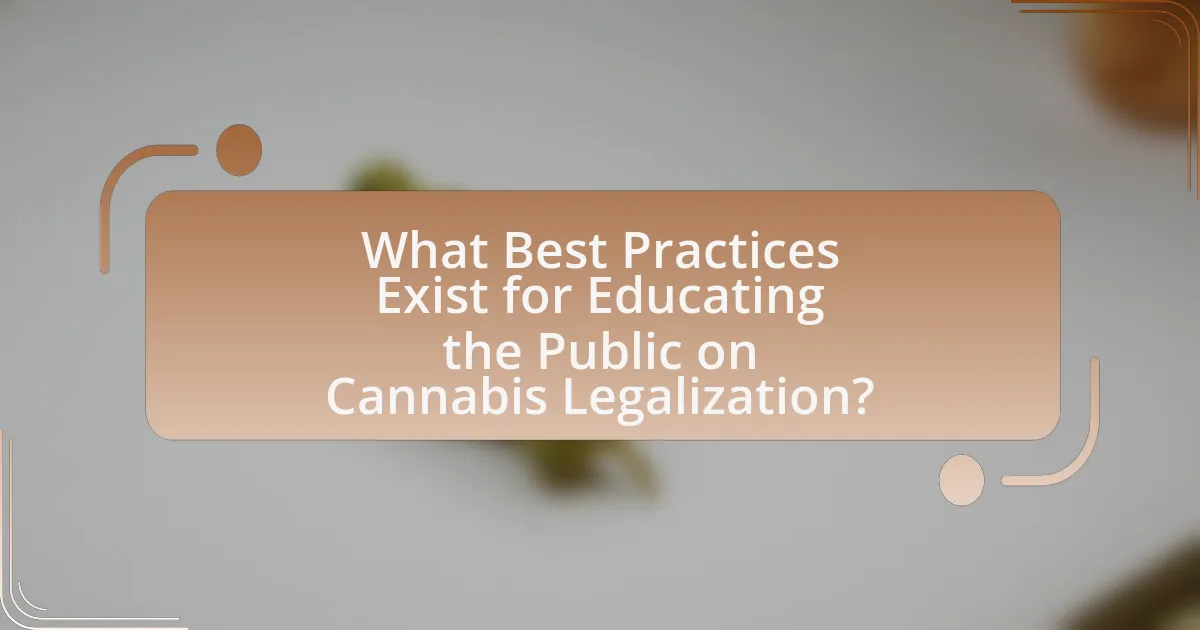
What Best Practices Exist for Educating the Public on Cannabis Legalization?
Best practices for educating the public on cannabis legalization include providing accurate, evidence-based information, engaging community stakeholders, and utilizing multiple communication channels. Accurate information is crucial; studies show that misinformation can lead to public resistance. Engaging community stakeholders, such as local leaders and health professionals, fosters trust and encourages dialogue. Utilizing various communication channels, including social media, public forums, and educational workshops, ensures broader reach and accessibility. Research indicates that campaigns employing these strategies are more effective in changing public perceptions and increasing support for legalization.
What are the key components of an effective educational campaign for cannabis legalization?
An effective educational campaign for cannabis legalization includes clear messaging, targeted audience engagement, credible information dissemination, and community involvement. Clear messaging ensures that the campaign communicates the benefits and facts about cannabis legalization in an understandable manner, which is crucial for changing public perceptions. Targeted audience engagement focuses on identifying and addressing the specific concerns of different demographic groups, such as parents, healthcare professionals, and law enforcement, to foster a more inclusive dialogue. Credible information dissemination relies on using scientifically backed data and expert testimonials to build trust and counter misinformation; for instance, studies from the National Academies of Sciences, Engineering, and Medicine have shown that cannabis can have therapeutic benefits. Lastly, community involvement encourages grassroots participation, allowing local voices to share personal stories and experiences, which can significantly influence public opinion and policy decisions.
How can campaigns tailor their messages to different demographics?
Campaigns can tailor their messages to different demographics by utilizing targeted messaging strategies that consider the specific values, preferences, and communication styles of each group. For instance, research indicates that younger audiences may respond better to digital platforms and informal language, while older demographics might prefer traditional media and more formal communication. Additionally, campaigns can analyze demographic data, such as age, gender, and cultural background, to create content that resonates with each group’s unique experiences and concerns. This approach is supported by studies showing that personalized messaging increases engagement and effectiveness, as seen in the 2019 Pew Research Center report, which highlights the importance of demographic considerations in communication strategies.
What role does collaboration with experts play in enhancing educational content?
Collaboration with experts significantly enhances educational content by ensuring accuracy, depth, and relevance. Experts bring specialized knowledge and experience, which enriches the material and makes it more credible. For instance, in public awareness campaigns for cannabis legalization, collaborating with medical professionals and legal experts can provide factual information about health effects and legal implications, thereby improving the educational value of the content. Research indicates that educational programs that incorporate expert insights are more effective in conveying complex topics, as evidenced by studies showing increased retention and understanding among audiences when expert opinions are included.
What resources are available for organizations aiming to educate the public about cannabis?
Organizations aiming to educate the public about cannabis can access a variety of resources, including government publications, educational websites, and community outreach programs. Government agencies like the National Institute on Drug Abuse (NIDA) provide research-based information on cannabis effects and usage, while the Substance Abuse and Mental Health Services Administration (SAMHSA) offers resources for prevention and education. Additionally, organizations such as the Marijuana Policy Project (MPP) and the Cannabis Consumer Coalition provide educational materials and advocacy tools. These resources are essential for ensuring that the public receives accurate and comprehensive information about cannabis, supporting informed decision-making and awareness.
How can organizations leverage partnerships to improve educational outreach?
Organizations can leverage partnerships to improve educational outreach by collaborating with community groups, educational institutions, and healthcare providers to disseminate accurate information about cannabis legalization. These partnerships enable organizations to tap into existing networks, enhancing their reach and credibility. For instance, a study by the National Institute on Drug Abuse highlights that community-based partnerships can effectively increase awareness and understanding of cannabis-related issues, leading to more informed public discourse. By pooling resources and expertise, organizations can create comprehensive educational programs that address misconceptions and promote responsible use, ultimately fostering a more informed community regarding cannabis legalization.
What practical tips can be implemented for successful cannabis education campaigns?
Successful cannabis education campaigns can be implemented by focusing on clear messaging, engaging content, and community involvement. Clear messaging ensures that the information is easily understood, avoiding jargon and using relatable language. Engaging content, such as interactive workshops and social media campaigns, captures attention and encourages participation. Community involvement fosters trust and relevance, as local stakeholders can provide insights and support tailored to specific audiences. Research indicates that campaigns incorporating these elements are more effective; for instance, a study by the National Institute on Drug Abuse found that community-based approaches significantly improve public understanding and attitudes towards cannabis.
